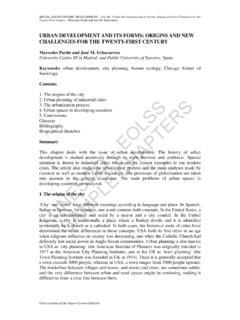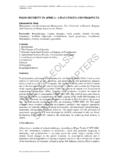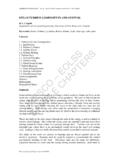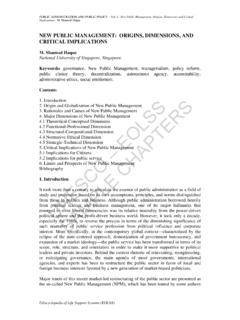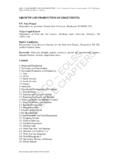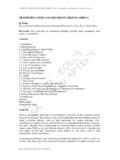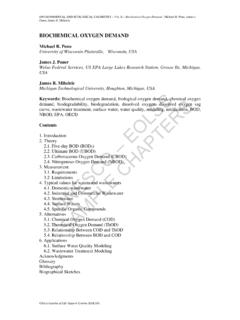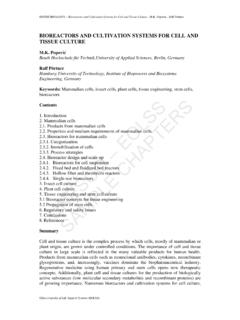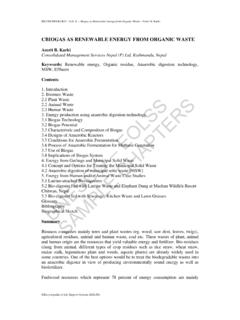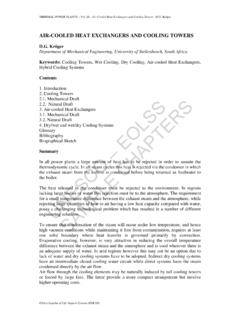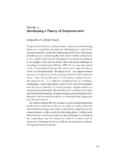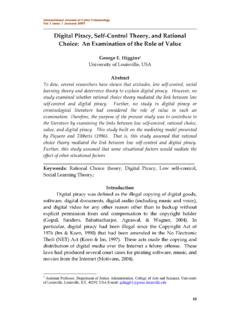Transcription of Feminist Sociological Theory
1 UNESCO EOLSSSAMPLE CHAPTERSHISTORICAL DEVELOPMENTS AND THEORETICAL APPROACHES IN SOCIOLOGY Vol. II - Feminist Sociological Theory - Celia Winkler Encyclopedia of Life Support Systems (EOLSS) Feminist Sociological Theory Celia Winkler Department of Sociology, The University of Montana, USA Keywords: Feminism, Feminist , social Theory , Sociological Theory Contents 1. Introduction 2. Classical Sociology 3. Feminism and Feminist Sociology in the Post-War Era 4. Feminist Sociology in the 1960s, 1970s, and 1980s: The Second Wave 5. Investigating Women s Issues 6. Explaining Gender Differences and Gender Inequality Different Voices, Different Ways of Knowing and Doing Gender Social Structures and Gender Inequality 7.
2 The Changing Face of Feminist Sociologies The Influence of Poststructuralism Sexualities Masculinities Transnational Feminisms 8. Final Thoughts Glossary Bibliography Biographical Sketch Summary In this chapter, we will examine the Sociological and Feminist foundations of Feminist Sociological Theory . feminists argue that that without gender as a central analytic category, social life work, family, the economy, politics, education, religion cannot be adequately will consider the way that sociology has been centered on the male, informed by male perspectives, and dominated by men until relatively recently. We will then take a brief glimpse at the Feminist movements in Europe and North America and the way they may have affected the development of Feminist Sociological Theory .
3 At this point we will summarize European and English language Feminist Sociological Theory in the early Second Wave, briefly examining how Feminist sociologists go about studying social life, and how they explain gendered inequality. Finally, we will pay attention to the changing field of Feminist Sociological Theory , with the contributions and transformations brought by postmodernism, the study of masculinities and sexuality, and transnational Feminist scholars. 1. Introduction Feminist Sociological Theory is both an academic and a political approach to the study of society. It is critical and didactic; it analyzes and informs.
4 It is inseparable from method. Feminist sociology emerged as a response to the missing gender in classical sociology, UNESCO EOLSSSAMPLE CHAPTERSHISTORICAL DEVELOPMENTS AND THEORETICAL APPROACHES IN SOCIOLOGY Vol. II - Feminist Sociological Theory - Celia Winkler Encyclopedia of Life Support Systems (EOLSS) setting forth an agenda for academic and social change. Because feminism, as we shall see below, is interdisciplinary in nature, Feminist Sociological Theory has pulled in observations and approaches from political science, literature, geography, anthropology, and probably most importantly, philosophy. It has been excluded and marginalized, and probably never really understood by most sociologists.
5 In this chapter, we will examine the Sociological and Feminist foundations of Feminist Sociological Theory and its effect on the discipline of sociology. The starting point is a consideration of the way that sociology has been centered on the male, informed by male perspectives, and dominated by men until relatively recently. Although women have been active participants since its inception, their voices and perspectives were marginalized in the discipline during most of the 19th and 20th centuries. feminists argue that that without gender as a central analytic category, social life work, family, the economy, politics, education, religion cannot be adequately studied.
6 Because Feminist sociology has its roots in European and English language scholarship, most of our attention will be directed there, examining the scholarship that has uncovered the gendered basis of social institutions in western modernity. However, in the last few decades, sociologists and activists outside these areas have made considerable contributions to the subdiscipline, and in fact, have steered it in new directions, considerably expanding it beyond the narrow question of whether women are oppressed relative to men in modern society. Once open to the notion of re-centering the marginalized other, Feminist sociology is now informed by the insights of women in the global south and east, reflexively responding to the contradictions and conflicts within and outside the subdiscipline.
7 One problem in thinking about Feminist Sociological Theory is whether it is distinct from other Sociological traditions, and should be considered separately, or whether the work of Feminist sociologists should be included within the subdisciplines. For example, should Feminist symbolic interactionists be thought of as primarily symbolic interactionists or as feminists ? Do we talk about Feminist sociology of organizations as integrated into the larger subdiscipline of organizations or combined with their sisters in, for example, Feminist welfare state studies? Similarly, how do we define feminism? From an historical perspective, can one call a woman writing about women a Feminist , if she did not use the term?
8 What about women writing about men? Can men be Feminist ? The definition of feminism has expanded from an early notion of simply challenging women s subordination to men and arguing for their equal rights, to seeing and understanding the social world from the vantage points of women, to changing systems of oppression based on western masculinist relations of ruling. And the definition of feminism is always changing, never static, never unitary, always subject to the specific understandings of the theorist. At the same time, there is a constant effort to find unity in the differences, a unity that can encompass all people who are affected by gender regimes, however they are manifested.
9 It is the work of the Feminist Sociological theorist to grapple with these contradictions. UNESCO EOLSSSAMPLE CHAPTERSHISTORICAL DEVELOPMENTS AND THEORETICAL APPROACHES IN SOCIOLOGY Vol. II - Feminist Sociological Theory - Celia Winkler Encyclopedia of Life Support Systems (EOLSS) Our first task in this chapter is to look at the missing gender(s) in classical European and North American sociology, while also bringing in forgotten women of classical sociology, including Harriet Martineau, Marianne Weber, Charlotte Perkins Gilman, Alexandra Kollontai, Anna Julia Cooper, and Jane Addams. We will then take a brief glimpse at the Feminist movements in Europe and North America and the way they may have affected the development of Feminist Sociological Theory .
10 At this point we will summarize European and English language Feminist Sociological Theory in the early Second Wave . We will briefly examine how Feminist sociologists go about studying social life, and how they explain gendered inequality. Finally, we will pay attention to the changing field of Feminist Sociological Theory , with the contributions and changes brought by postmodernism, the study of masculinities and sexuality, and transnational Feminist scholars. 2. Classical Sociology In the writings about women, sex, and gender in the classical era, for the writers typically thought to be the fathers of sociology Comte, Marx, Durkheim, Weber, and Simmel women were either almost completely ignored, or briefly discussed and then dismissed, or located within specific social locations such as the family.
